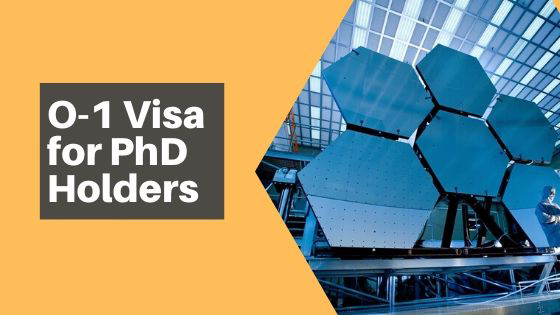The O-1 visa category is designed for individuals with extraordinary achievements in science, arts, education, business, or athletics. It is typically referred to as a highly prestigious nonimmigrant visa because of its numerous advantages which are not available in other nonimmigrant categories. However, because of this, the O-1 is a highly competitive visa that requires more exclusive qualifications. Having extraordinary achievements means you possess skills, qualifications, and experience that are not ordinarily encountered in your field.
How Easy Is O-1 Visa Application for Ph.D. Holders
Being a Ph.D. holder is indeed an advantage to your application process. However, having a Ph.D. in and of itself does not guarantee you an O-1 or any other visa.
The O-1 visa process requires more than just having the credentials. You must leverage all your past achievements, academic qualifications, and working relationship with experts in your field to meet the stringent eligibility criteria. This is why it is strongly recommended that you work with an immigration attorney.
The Benefits of an O-1 Visa for Ph.D. Holders
The O-1 visa gives Ph.D. holders several advantages that are not available through most other nonimmigrant visas. Some of those benefits include:
A Longer Validity Period
Generally, the O-1 visa is valid for an initial period of three years with the option to extend your stay indefinitely in one year-increments. Most other visas have a specific period of stay. For instance, the H-1B and L-1 visas will only allow you a maximum period of stay of six and seven years, respectively. With an O-1 visa, you can be in the U.S. for as long as you need by renewing your status before it expires.
No Annual Visa Cap
While there is a limit to the number of visas that can be issued annually for certain work classifications, the O-1 does not have an annual cap. This means you can apply for the category without having to worry about competition from other applicants who may have submitted their petitions before you. For instance, some visa category annual caps are filled within hours of the submission window, forcing other applicants to wait until the following year.
Unrestricted Freedom to Travel
As an O-1 visa holder, you may travel freely in and out of the U.S. as frequently as you wish. Leaving and reentering the United States will only require your valid passport, a copy of your O-1 petition, and the original I-797 approval notice.
Dual Intent
This is perhaps the biggest advantage of having an O-1 visa. The category has “dual intent,” which is the ability to apply for an adjustment of status from nonimmigrant to immigrant. After some time under O-1 status, you can apply for a green card to become a permanent resident in the U.S. Not all visas have this benefit.
There are several categories of employment-based green cards. However, as a Ph.D. holder, you stand a good chance of qualifying for the most prestigious category, which is the EB-1 green card. Just like the O-1, the EB-1 is also specifically designed for individuals with extraordinary achievements and has similar requirements, meaning you may already meet the criteria if you qualify for an O-1.
Your Immediate Family Members
All qualified O-1 applicants are allowed to bring their immediate family members with them. Additionally, your children and spouse will also get to enjoy all the benefits attached to the status, including the indefinite period of stay and green card opportunities.
O-1 Visa for Ph.D. Holders Eligibility Criteria
Your academic qualification and experience in your specialty will make it easier to meet many of the necessary O-1 requirements. However, just as it is with any other immigration application, there is more to O-1 than being a Ph.D. holder.
The United States Citizenship and Immigration Services (USCIS) will want you to demonstrate that you have documentary evidence to support your claims. To be deemed an individual with extraordinary achievements, you must provide evidence showing that you have received a major internationally recognized award with the same prestige as a Nobel Prize, or you have at least three of the following evidentiary eight criteria:
- Receipt of internationally or nationally recognized awards or prizes for excellence in your field of specialization
- Published material in a professional journal or major media about your work
- Evidence of authorship of scholarly works in your field in a major media publication or professional journals
- Evidence that you have participated as a judge of the work of others in your field, either as a member of a panel or individually
- Evidence of original scientific or scholarly contributions of major significance in your field
- Membership in an association in your field that requires outstanding achievement. This means your membership must be based on merit and must have been granted by experts in your field.
- Evidence of employment in a critical or essential capacity for a reputable organization in your field
- Evidence that you command a high salary when compared to others in your field
O-1 Visa Document Checklist for Ph.D. Holders
The very first step is to have a job offer in your field from a U.S. employer. Your employer will be the one to petition the USCIS on your behalf by filing an I-129, Petition for Nonimmigrant Worker. To avoid delays, it is crucial to submit the petition as early as possible, at least 45 days prior to the start date of employment. The petition must be submitted with the following documentary evidence:
Consultation
You will need to submit your O-1 application along with a letter of recommendation from a peer or group of peers such as a labor organization or an individual with expertise in your field. It is best to provide an original copy of the letter with a watermark or other distinctive mark as anything less might raise doubts about its authenticity.
The USCIS may waive the consultation if you can provide evidence that there aren’t such organizations or peer groups in your field.
Employment Contract
A copy of the employment contract between you and your employer must be provided. If the contract was in oral terms, you must provide a summary of the terms of the oral agreement with some documentary evidence, such as emails between the two of you or any other proof that demonstrates you both reached a conclusion in terms of what was offered and what was accepted.
Itineraries
The USCIS will want to know the details of what your job description entails. You will need to provide an explanation of the activities and events, including the start and end dates of each of the tasks your job will cover. The itineraries will serve as proof as to whether the work you are applying for is indeed related to your area of expertise.
Filing Fees
The O-1 filing fees must be submitted with the I-129. The basic O-1 filing fee is $460. You can also use the premium processing service to expedite the process. The premium processing service guarantees that you will receive a decision on your application within 15 calendar days instead of the usual two to three months for an additional fee of $1,440.
O-1 Visa Application Process for Ph.D. Holders
This will depend on whether you are already in the United States or you are applying from outside the U.S. If you are already in the U.S. on another nonimmigrant status, you will be able to change your status. If you are outside the U.S., you will need to apply for a visa.
Change of Status to O-1
A change of status is done by the USCIS. Once the I-129 filed by your employer is approved, you will be granted O-1 status. Many international Ph.D. students on student statuses such as the J-1 visa may be eligible for a change of status to an O-1. The same applies to foreign nationals who are currently in the U.S. on an employment-based nonimmigrant visa.
If your spouse and children would also like to change their status to the O classification, they can apply for O-3 status. This will be done by filing an I-539. The filing fee for the I-539 is $370.
Applying for an O-1 Visa
If you are outside of the United States, once the I-129 petition is approved, you will need to apply for an O-1 visa through consular processing at a U.S. embassy or consulate in your country of residence. The consular processing involves filing a DS-160 and attending a one-on-one interview with a consular officer. After a successful interview at the embassy, you will be issued an O-1 visa which will allow you to travel to the U.S. The DS-160 filing fee is $190 for each applicant.
O-1 Visa to EB-1 Green Card Process
As explained above, the O-1 is a dual intent visa and the most applicable green card as a Ph.D. holder is the EB-1. Compared to other categories, the processing time going from O-1 to EB-1 status may be short due to the similarities in the eligibility criteria.
To apply for an EB-1 green card, you don’t need an employer to sponsor you. This is one of the biggest advantages that distinguish the EB-1 from other categories. You can self-petition by filing an I-140. Depending on the workload at the service center in charge of your case, the processing time for the I-140 petition is around six to eight months. You can use the premium processing service to cut down the time to 15 calendar days.
Once the I-140 petition is approved, then you will apply for status adjustment to lawful permanent resident status by filing an I-485. This may also take around six months.
EB-1A and EB-1B Ph.D. Green Card
The EB-1A green card is appropriate for those applicants with extraordinary achievements and talents in different areas, including sports, business, science, arts, and more. However, you still need to present evidence of your achievement, such as an international award. On the other hand, the green card for EB-1B Ph.D. holders is designed for outstanding researchers and processors. Unlike the EB-IA green card, this one handles a narrower group. Also, the requirements are not demanding.
Eligibility for a Ph.D. Green Card
An applicant that has the required documents is eligible for a Ph.D. green card. However, the applicant will need to prove that he is an expert in his or her field and that he or she has a proven track record of national or global acclaim in that field. Ideally, you should ask your lawyer if you are eligible or not. While it’s called a Ph.D. green card, you do not need the actual Ph.D. to be eligible for this residency document. You only need to prove that your work has or will have a great impact in your field.
Ph.D. Green Card Requirements
When applying for a green card, you will have to submit certain documents. However, the nature and number of documents will determine the number of green cards you will be awarded-whether it is an EB-1B or EB-1A green card. You will have to submit the following for EB-1B green card:
- Material published in your name by other scholars showcasing your work.
- Membership in organizations that require outstanding work for entry.
- Proof of your contribution to important scholarly or scientific research in your field.
- Proof of your participation as a judge evaluating the work of other scholars.
- Scholarly articles published in reputable publications in your field.
- Evidence that you have received a renowned award in your field for your efforts.
- Proof of your participation in a crucial role in a reputable company.
On the other hand, you need to submit the following when applying for an EB-1A green card:
- A large salary that indicates your competence in your field.
- Evidence of significant contribution regarding your practice.
- Material written by others detailing your abilities.
- Several scholarly articles published in a professional or trade journal.
- An award that received international or national recognition.
- Proof of your membership in an association that requires its members to have extraordinary abilities.
These are a few examples. However, according to the USCIS, if your extraordinary achievements do not fall under any of the above categories and you have other comparable evidence, you may still submit an application. It would be best if you worked with your lawyer to ensure that you are awarded the green card. The lawyer will let you know if you have any evidence we have not mentioned above.
Ph.D. Green Card Cost
When applying for your Ph.D. green card with USCIS, you will need to pay $700. However, keep in mind that you may have to spend more on an attorney. While you don’t necessarily need a lawyer, he or she will help you to process your card and also work to ensure your petition is not denied.
 Shilpa Malik
Shilpa Malik  Boris Ignachkov
Boris Ignachkov 